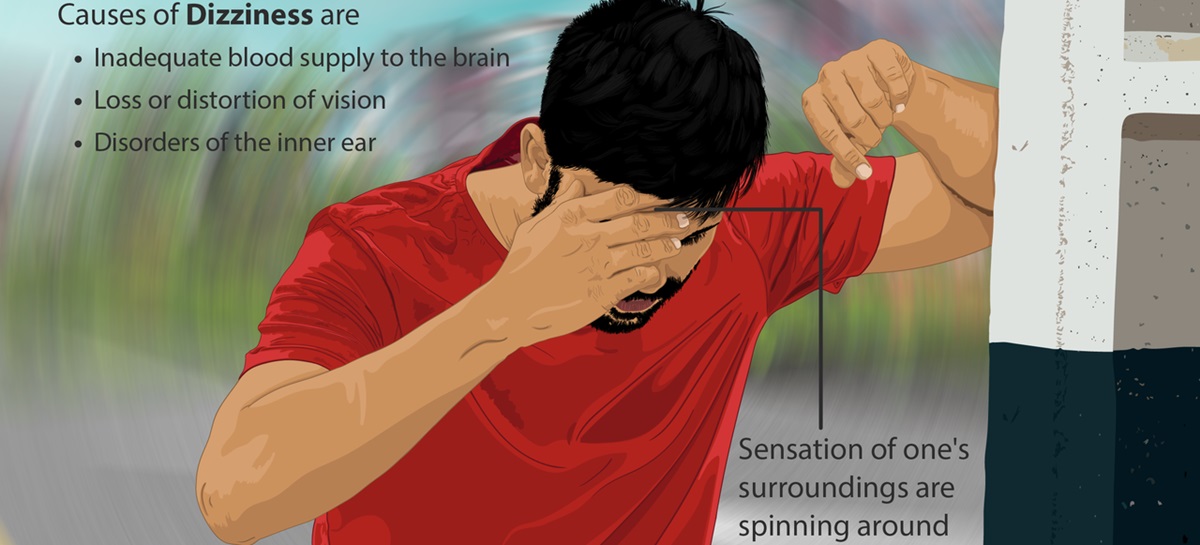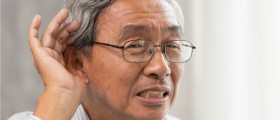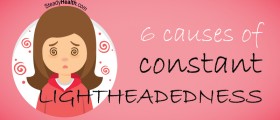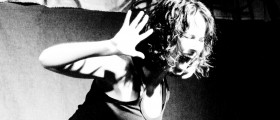Dizziness can be described as a feeling of faintness or lightheadedness, but also as the sensation of being weak and unsteady on your feet. Sometimes, dizziness may involve a sense that the surrounding objects or room are spinning or moving. If this happens, the condition is called vertigo.
Dizziness is not a medical condition itself but rather a symptom of some other condition. Sometimes, it occurs naturally as a result of certain disturbances in the body. This is a very common condition, and it accounts for many visits to the doctor’s office. If you frequently suffer from dizzy spells, it may be a warning sign of a potentially dangerous health condition — and though it is normal to feel dizzy as you step off a rollercoaster, random and unexplained dizziness always demands medical attention. Most commonly, dizziness occurs upon rising, in which case it is caused by a sudden drop in blood pressure.

Signs and Symptoms of Dizziness
As already mentioned, dizziness is separate from vertigo and lightheadedness. Knowing the signs and symptoms of dizziness may help to explain the symptoms to doctor and help narrow down the list of possible causes. Often, people use the word “dizzy” to describe both feelings of lightheadedness and vertigo.
When discussing the symptoms you are suffering from with your doctor, it is important to be very clear and explain whether the lightheadedness or vertigo causes problems upon rising. Lightheadedness is a feeling that a person is just about to pass out. However, in this case, there is no feeling that the surroundings are moving. In vertigo, a patient has the feeling that the surroundings are moving, and a person feels like he or she is spinning, falling or whirling. In many cases, people may have problems with balancing, walking, or even standing up.
Causes of Dizziness Upon Rising
In most of the cases, the cause of dizziness upon rising is a drop in blood pressure, a phenomenon that is called orthostatic hypotension. This sudden drop in blood pressure is actually a failure of autonomic nerve function that occurs when a patient suddenly changes the position of their body. When a patient changes their body posture from lying to standing up, this sudden dip in the blood pressure occurs, and there is not enough of blood flow to the brain. The brain, deprived of oxygen, has difficulty functioning, and symptoms of dizziness occur.
- The study involved 11,709 people with an average age of 54 who were followed for an average of 25 years.
- Researchers determined that 552 participants, or 4.7 percent, had orthostatic hypotension at the start of the study.
- During the study, 1,068 people developed dementia and 842 people had an ischemic stroke, which is a stroke where blood flow is blocked to part of the brain.
- Researchers found those who had orthostatic hypotension at the beginning of the study had a 54 percent higher risk of developing dementia than those who did not have orthostatic hypotension at the beginning of the study.
- A total of 999 of the 11,156 without orthostatic hypotension, or 9 percent, developed dementia, compared to 69 of the 552 people with orthostatic hypotension, or 12.5 percent.
- A total of 15.2 percent, or 84 of 552 people, with orthostatic hypotension had an ischemic stroke, compared to 6.8 percent, or 758 of 11,157 people without orthostatic hypotension.
The condition may be managed with medication, but eating well and staying hydrated also helps reduce your symptoms. Even sleeping with an elevated pillow or getting up very slowly can prevent your feelings of dizziness upon rising.
Sometimes, this sudden drop in blood pressure and the resulting dizziness happens as a side effect of other underlying conditions, such as diabetes or Parkinson’s disease. These conditions affect the blood pressure and the heart rate, leading to feelings of dizziness.
Dizziness upon rising can also occur as an effect of allergies, or more severe illnesses such as the flu and the common cold. Whenever the body is compromised and sensitive, this autonomic nerve function may fail. Anything that causes dehydration can also cause dizziness upon rising.

















Your thoughts on this
Loading...